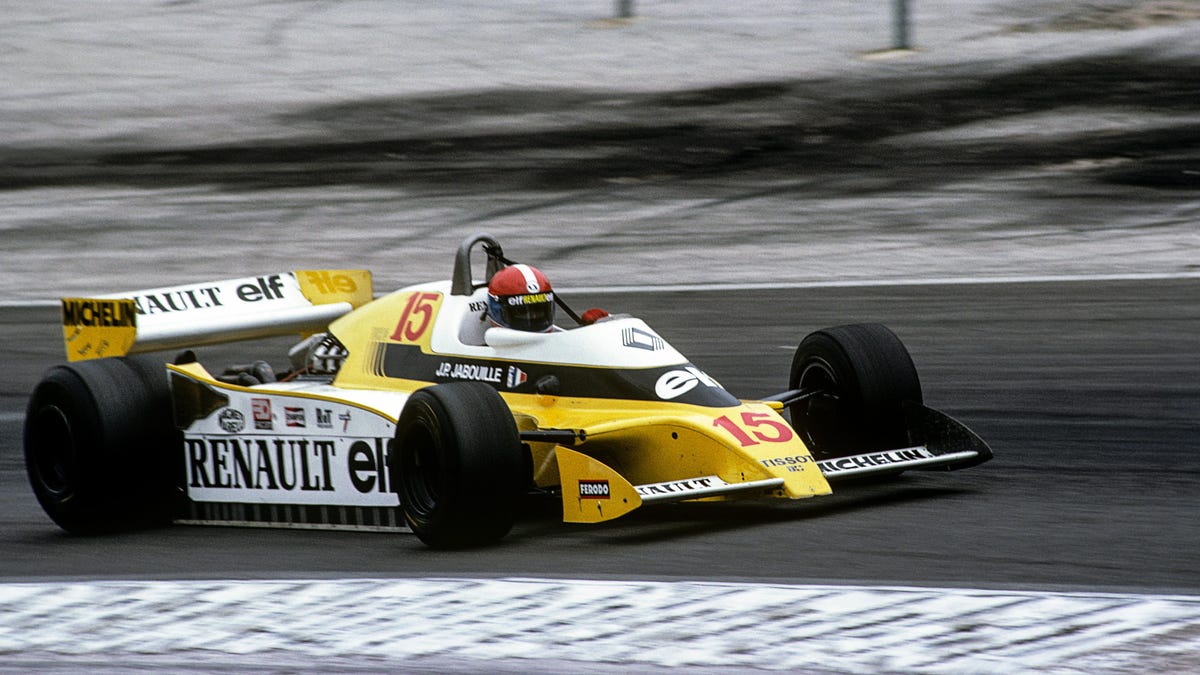
“And so now! A French driver in a French automotive with a French engine on French tires is main the French Grand Prix,” Murray Walker mentioned on the forty seventh lap of the 1979 French Grand Prix. Jean-Pierre Jabouille would go on to win that day in Dijon for his first Components 1 victory, Renault’s first F1 victory, and the primary F1 win for a turbocharged automotive. Jabouille, 80, died on Thursday, in accordance with reviews. Jabouille would win solely as soon as extra in F1 — in Austria in 1980 — however the 1979 victory in a notoriously unreliable Renault cemented his legacy.
Yow will discover video highlights of the 1979 French Grand Prix right here. (Components 1 doesn’t permit some content material to be embedded.) You may see Jabouille take the lead beginning at 5:00, after which, round 6:50, you’ll be able to see what could be probably the most thrilling battle for second in Components 1 historical past, as Jabouille, far forward of Gilles Villeneuve and René Arnoux, cruised to victory. And right here’s a shorter model of that in French:
Jabouille described in an interview in 2019 the facet eye that turbo engines had been met with on the time.
“There was a number of scepticism within the F1 within the early days about the usage of turbos. A lot of jokes had been made about it, significantly among the many different groups – the competitors didn’t consider in it in any respect. Maybe there was each cause for that on the time. Solely in the midst of the straights, engine energy was optimally out there whereas within the bends there was nothing in any respect. The engines ran nice beneath chilly circumstances, in sizzling climate they had been hopeless.”
“Renault’s improvement of the turbo engines began in 1972/1973. Preliminary checks had been carried out with one giant turbocharger (RS01), however quickly two small turbos, with a much-improved response time (from the RS10-on) had been used. We had been additionally slowly however absolutely gaining advantages of improved streamlining. Once I drove a turbo powered Renault RS10 over the end line because the winner throughout the French Grand Prix in 1979, that gave a full French victory: a French driver in a French automotive on a French circuit and on French tires. We had been very proud!”
The jokes, it needs to be mentioned, weren’t unwarranted, as Renault’s turbos within the early days had been extremely unreliable. Jabouille retired from all however one race in 1977, from 9 races in 1978, from ten races in 1979, and from eleven races in 1980, the season when he crashed on the Canadian Grand Prix and broke each of his legs.
“I broke each my legs after which had troubles with each legs and knees. At the moment, a driver was positioned very a lot within the entrance of the automotive, which meant that you simply had been hit even within the slightest collision. I remained within the automotive for half-hour after the crash passed off.”
G/O Media could get a fee
He would by no means be the identical once more, trying solely 5 races in 1981 earlier than calling it quits in Components 1 for good. Nonetheless, Jabouille’s level had been made in Dijon, and turbocharged engines dominated the Eighties earlier than getting banned in 1989.
Alain Prost took to Instagram to share his regrets:
“A black yr for French F1 and a terrific second of unhappiness even immediately! RIP Jean Pierre! You’ve been a real good friend and mentor in my starting! Your recommendation and evaluation had been very helpful to me. French Motorsport owes you a large number! You deserved a lot extra. We should and can keep in mind you as a pioneer, a person with excellent frankness and sincerity! Hugs to you”
The BBC additionally printed an announcement from Alpine, Renault’s present consultant in F1:
“A humble racing driver, good engineer and a pioneer of our sport. Jean-Pierre was a real racer.
“He spearheaded Renault’s journey into F1 in 1977 along with his resilient and dare-to-do angle. He was Renault’s first Grand Prix winner in 1979, a landmark second in Renault’s journey in Components 1.
“His dedication and dedication to succeed impressed many, and these values stay central to the present crew in its now blue colors of Alpine.
“We’re the place we’re immediately due to Jean-Pierre and his legacy lives on.”



